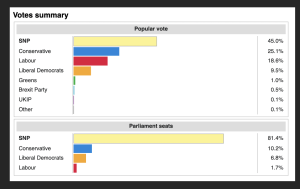The issue of Scottish independence has been a sorely divided issue since the political partnership of England and Scotland began in 1707 with the Union with Scotland Act 1706. Though long lasting, the relationship has become increasingly discussed over the last half century, culminating in the creation of the Scottish parliament on July 1, 1999, and the Scottish National Party (SNP) emerging as a dominant political voice in command of Scotland’s national agenda. The Scottish parliament was created as a devolved house where some legislative authority over Scotland was passed down from the House of Commons allowing for an increase in the long-sought self-governance. This can, in principle, be compared to a federalist system in which local authorities are given the power to legislate in addition to the federal power, but in conflicts, the federal rules supersede that of the devolved body. A referendum on independence was held in September 2014 which asked voters “Should Scotland be an independent country?”. The referendum failed with a small majority voting “no” (55.30%).
Since the referendum in 2014 the United Kingdom has had another major political upset resulting in the “Leave” campaigns successful lobby of an exodus from the European Union (EU). Scottish voters overwhelming supported remaining in the EU (62.00%), and Scotland was the only country in the United Kingdom of Great Britain and Northern Ireland (UK) to vote in favor of remaining. Leader of the SNP in the UK parliament Ian Blackford alluded to this constantly over the 47 months between the Brexit vote and the leave date in January 2020 and promised that the voice of the Scottish people would be heard.
If a relationship with Europe, a sense of national identity, and an increasing desire for self-governance weren’t reason enough for Scotland to desire independence, the 2023 Periodic Review of Westminster constituencies has promised to remove an additional two seats from Scotland resulting in less legislative power in the House of Commons, the primary legislative body governing the UK. This is in contrast to a system like the Canadian parliamentary system that guarantees no reduction in representation of provinces, even if those provinces shrink in population or grow more slowly relative to others. Canadian provinces are comparable to the participating countries in the UK. The 2023 Periodic Review of Westminster constituencies has thus far not been approved by the House of Commons but as it is a matter of routine maintenance of the electoral system, it is not expected to be overly contentious.
This political divide, mapped by many reports and opinion polls, show that sentiments among Scottish voters have shifted in favor of independence. The renewed discussion of independence (though one could argue that following the failed 2014 referendum there was no end to the discussion) have commanded consideration of a second independence referendum.
There are many qualities in addition to favorable views of Europe and the EU which set Scotland apart from their UK countrymen. Scotland is generally supportive of electoral systems utilizing Proportional Representation (PR) as opposed to (or at least in addition to) First Past The Post (FPTP). The particular version of PR that Scotland employs in the Scottish parliament is the Additional Member System (AMS). AMS is similar to the Mixed-member proportional representation (MMP) which has two tiers of MPs:
- Locally elected representatives (SMD)
- Additional members which are distributed based on a party list (PR)
The difference between this system and MMP is that AMS is non-compensatory and does not grant “overhang” seats in the same way as the German system. This system is a hybrid of the FPTP and List PR system which seems to be generally favored in Scotland. Local levels have moved to Single Transferable Vote (STV), a more proportional system than AMS, and there is support for STV to become adopted at the Scottish Parliament level as well. At the UK level, Scotland is subject to the same effects of Duverger’s law (that parties converge at the ideological center) as any other FPTP model, however there is a functioning four effective party system in place that are granted regular seats in Scottish constituencies. Dani Garavelli wrote in may 2021 in the New Statesman “All this is theoretical. If [a new Scottish Party] wins seats – and particularly if pro-independence parties are over-represented – that might focus minds. But under the Scotland Act, it takes a two-thirds majority to change the electoral system. Though the Lib Dems and the SNP still favour STV, and the Greens back an Open List PR system, this is unlikely to be a priority for an administration dealing with a pandemic.”8
Nicola Sturgeon, First Minister of Scotland, formally requested the authority to hold a second independence referendum in 2020. Under Section 30 of the Scotland Act 1998 the UK House of Commons, House of Lords, and the Scottish Parliament must all vote to devolve legislative powers to Scottish voters via a referendum for the referendum to take place2. This acts as a level of permission which must be approved independently by all institutional bodies. The house of Lords, being mostly ceremonial, should not have any opposition to the devolution, just as there was no opposition in 2014. The Scottish Parliament is already in favor of a second referendum, being controlled by the SNP who included support for the second vote in their manifesto in 2019. Only the UK Prime Minister, Boris Johnson, has so far rejected a vote in the House of Commons. This leads us to a natural question: why has Johnson, or perhaps the Conservative party, prevented this vote?
For many, the questions that arise while considering Scottish independence lay within the borders, political institutions, and electoral systems of Scotland. Another, perhaps more pressing question is how the removal of an entire country will affect the electoral systems in the remaining United Kingdom. In order to understand the circumstances around a likely occurrence of Scottish independence, we should first examine which political party, if any, will be helped by the outcome of Scottish Independence and who might therefore have an incentive to devolve the powers necessary for a second referendum. The SNP being unlikely to form a government in the UK leaves the The Conservatives, Labor, and Lib-Dems
As discussed in a Commons Library service publication,
“The loss of 59 seats in the UK House of Commons would lead to the first major change in its composition since the creation of the Irish Free State in 1922 and the substitution of 13 Northern Ireland seats for the pre-war total of 105 MPs from Ireland.” 5
The modification of the seat makeup of the legislature in the UK presents an opportunity to consider what other reforms might be triggered by the exodus of these 59 seats. The question of furthering independence movements will be discussed later, but for now, an examination of the balance of power shifts in the UK is necessary. The current seat allocation of the 59 Scottish seats in UK Parliament. 48 seats (81.36%) are held by the SNP, 6 (10.17%) are held by the Conservative Party, 4 (6.77%) are held by Liberal Democrats, and 1 (1.69%) is held by the Labor Party. If this representation in UK parliament were to disappear overnight this would constitute a significant advantage for the Conservative party who would see their number of seats decrease by 6 votes while their opposition would decrease by 53 seats, nearly nine times more. It should also be noted that prior to the 2015 general election nearly all the seats held by the SNP were previously held by the Labor Party (56 in 2001 and 41 in 2015). So, if the exodus of Scotland seems inevitable in the coming decade, and the advantage to the Conservative party seems apparent, why is the Conservative government blocking the devolution vote in the UK parliament?
 Figure 1: 2019 UK general Election Seat Allocation Blue – Conservatives, Red – Labor, Yellow – Scottish National Party
Figure 1: 2019 UK general Election Seat Allocation Blue – Conservatives, Red – Labor, Yellow – Scottish National Party
 Figure 2: 2022 UK Current Seat Allocation: Blue – Conservatives, Red – Labor, Yellow – Scottish National Party, Dark Blue – Alba
Figure 2: 2022 UK Current Seat Allocation: Blue – Conservatives, Red – Labor, Yellow – Scottish National Party, Dark Blue – Alba
I can find three possible reasons for this opposition here listed in order of likelihood:
- The blowback from English, Welsh, and Northern Irish voters to the party that allows for the independence of Scotland will hurt the next cycles election results more than the benefit the Conservative party can see.
- The threat of an independent nation sharing the island of Great Brittan is too big a threat to the more cautious Conservative party which frames things in terms of relative advantage.
- It is the desire of a small cadre of high-ranking conservatives that are blocking the vote based on personal ideologies and beliefs.
- Party members, such as Boris Johnson, truly feel as though the matter of independence is settled.
It seems the most likely to me that if the Conservative party were to allow Scotland to have a second referendum (as the majority clearly desires and as the SNP has demanded) the political fallout from Conservative voters who would see the allowance of a vote as a betrayal of the principles of the UK will not see the political benefits to their party. The second consideration also seems plausible, but considering the allowance of the initial independence vote in 2014 it seems unlikely that this is more of a factor now. The third and fourth are similar enough to address together, and even if they are the case, even conservative voters will see this as insufficient to block a second vote.
In response to Nicola Sturgeon’s request for a second referendum the Citizens’ Assembly of Scotland was created and was asked to deliberate on three broad issues 1) What kind of country are we seeking to build? 2) How can we best overcome the challenges we face, including those arising from Brexit? 3) What further work should be carried out to give people the detail they need to make informed choices about the future of the country? The deliberations revealed that there was strong general support on policies related to voter representation, accountability and transparency, and political autonomy. Though there were the prevailing themes from the assembly there were other points that the Assembly discussed.
 Figure 3: 2019 Scotland General Election Results
Figure 3: 2019 Scotland General Election Results
The UK parliament has received push for electoral system reform in recent years, with the majority of reform groups advocating for an increase in Proportional Representation. In 2010 a conservative-Liberal Democrat coalition government held a referendum on the adoption of Alternate Vote for lower house elections. This was defeated (67.9%), and Scotland voting 63.64% “no”. What effect would the effect of independence of Scotland from the UK have on possible electoral reforms? The
Would the exodus of Scotland have an impact on the electorates in Whales and Northern Ireland? The balance of power in parliament, while already strongly favoring England, would clearly shift to further advantage English seats, adding to the disparity in representation. While independence movements in Whales and Northern Ireland are not nearly as vocal or well known as those in Scotland, they nonetheless exist. Following the announcement of the second Scottish independence vote Leanne Wood, leader of the Plaid Cymru, called for a renewed national debate on independence. This is, however, a small minority in the national debate, Plaid Cymru holding only 3 of 40 seats in UK parliament and holds 13 of 60 seats in the Welsh parliament. Irish is broadly seen to take the shape of Irish Reunification or “United Ireland”. According to the Irish Times, post Brexit, 51% of people from North Ireland are in favor of a referendum on reunification7.
This might suggest that a successful separation of Scotland from the UK might lead to a greater outlook by North Irelanders and the Welsh regarding their own independence from the UK. This would further impact seat allocation in the (hypothetical) remaining UK and would also allow for the electoral system to reflect the desires of the English voters alone. A preverbal snowball of power consolidating in the hands of the English starts an avalanche with each other country leaving due to the power imbalance of the relationship.
The balance of the evidence seems to suggest that independence is likely to happen in the next decade. When that happens, it is likely to renew discussion of political reforms. This is not likely to change anything as the constituencies most in favor of Proportional representation are the ones who will have left. The Conservative party has the most incentive to allow a second referendum, however Boris Johnson seems unlikely to allow this during his tenure, though that may be short lived if the minority government is successful in their most recent attempt for a vote of no confidence. If Scotland were to remain, it is possible that there would be enough support to move to AMS, AV, or another PR system which will almost certainly not happen anytime soon if they do indeed leave.
References:
- East Dunbartonshire Council “Scottish Independence Referendum 2014” https://www.eastdunbarton.gov.uk/council/elections-voting/scottish-independence-referendum-2014#:~:text=Scottish%20Independence%20Referendum%20%2D%20Result&text=The%20total%20number%20of%20ballot,The%20turnout%20was%2084.6%25
- https://commonslibrary.parliament.uk/research-briefings/cbp-8738/
- https://researchbriefings.files.parliament.uk/documents/CBP-8738/CBP-8738.pdf
- https://www.webarchive.org.uk/wayback/archive/20170104102702/https%3A//www2.gov.scot/resource/0043/00439021.pdf
- https://www.parliament.uk/business/publications/research/scotland-the-referendum-and-independence/impact-on-the-uk-parliament/
- “Parliamentary Constituencies Act 2020” 2020 CHAPTER 25 https://www.legislation.gov.uk/ukpga/2020/25/enacted
- Moriarty, Gerry “A united Ireland – is there something in the air?” Mar 13, 2017 https://www.irishtimes.com/news/ireland/irish-news/a-united-ireland-is-there-something-in-the-air-1.3007271 Retrieved: 03/03/2022
- Garavelli, Dani, “Is Scotland’s electoral system broken?” 5 May 2021, New Statesman https://www.newstatesman.com/politics/2021/05/scotland-s-electoral-system-broken Retrieved: 03/03/2022

